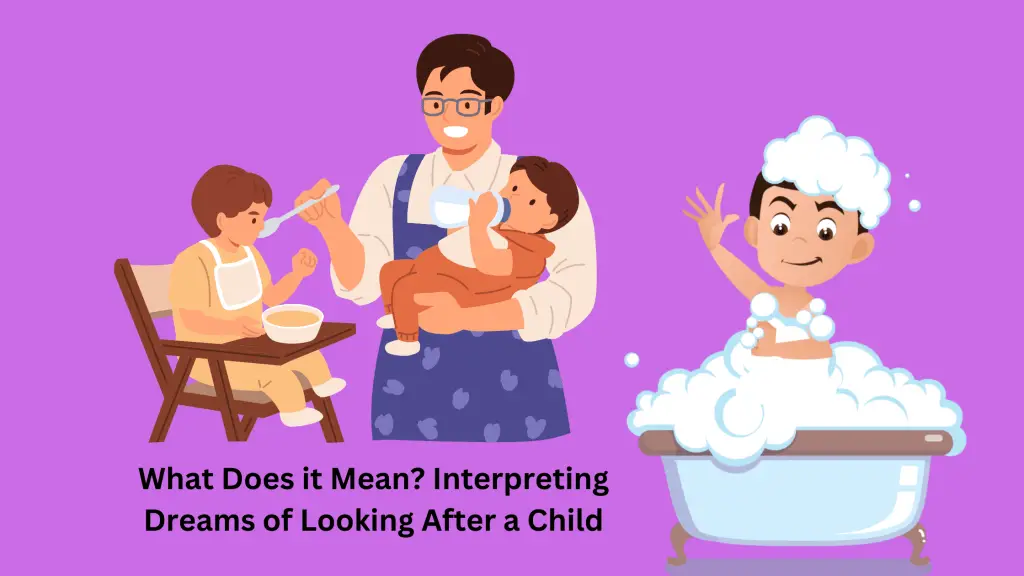
Dreaming about looking after a child can have different meanings depending on the context and emotions experienced within the dream.
In general, these dreams represent feelings of responsibility, nurturing instincts, and personal growth.
So what does it exactly mean when you dream of looking after a child?
When a person dreams of caring for a child, it may indicate a new sense of responsibility in their life. This could be related to their work, relationships, or personal goals.
For example, if they have recently taken on a new job or project, their subconscious might translate this into looking after a child in their dreams.
If the dreamer is a parent or has a strong desire to become one, the dream may reflect a sincere wish to provide love, guidance, and care to their current or future children.
In some cases, the child in the dream could symbolize a part of the dreamer’s own inner self that needs nurturing and attention.
Another interpretation of looking after a child in dreams could indicate personal growth and development.
In this context, the child could represent a new project, skill, or talent that the dreamer is learning or nurturing. The dream might serve as encouragement and motivation to continue on this path and take care of their personal growth.
It is essential to consider the emotions experienced in the dream when interpreting its meaning.
For instance, if the dreamer feels overwhelmed or stressed while caring for the child, it might suggest they feel overwhelmed in their waking life concerning their responsibilities.
On the other hand, if the dreamer feels a sense of joy and fulfillment while looking after the child, it could signify that they are embracing their nurturing instincts and assuming responsibilities with grace and confidence.
Common Themes in Child Care Dreams
Nurturing and Growth
In child care dreams, nurturing and growth are often significant themes that represent the dreamer’s desire to provide care and guidance.
The act of nurturing a child in a dream can symbolize personal development, growth, and the nurturing of oneself or one’s own ideas and projects.
Examples of nurturing and growth in childcare dreams may include the dreamer feeding or bathing a child, teaching a child a new skill, or helping a child to overcome obstacles.
These actions are symbolic of the dreamer’s own growth and development and highlight the importance of self-care and personal growth in one’s life.
Responsibility and Fears
Childcare dreams often convey themes of responsibility and fear.
These dreams may bring to the surface concerns and anxieties about one’s ability to fulfill their role as a caregiver, parent, or mentor.
Such dreams can serve as a way to work through these feelings of responsibility and any related fears or anxieties.
Examples of responsibility and fears in childcare dreams may include the dreamer losing a child, a child becoming ill or injured, or the inability to provide proper care for a child.
These situations highlight areas of concern related to caregiving abilities and may prompt the dreamer to examine their own feelings of responsibility, possible insecurities, or readiness for parenthood.
Connecting with Inner Child
Childcare dreams can also represent a connection with the dreamer’s own inner child.
The inner child represents the person’s true self or innate, childlike qualities, and is often used as a symbol of playfulness, innocence, and creativity.
In dream interpretation, caring for a child may symbolize the dreamer’s desire to connect with or nurture these qualities in themselves.
Examples of connecting with the inner child in childcare dreams may include playing with a child, engaging in creative activities together, or embracing the child in a comforting manner.
These interactions can serve as a reminder to the dreamer to nurture their own inner child and support self-expression, creativity, and playfulness in their waking life.
Common Scenarios for Dreams of Taking Care of Children
Dream about Taking Care of Your Own Child
In this dream scenario, you may find yourself caring for your own child, even if you don’t have one in real life.
This can represent your nurturing instincts, your feelings of responsibility and attachment, or a desire to establish a deeper connection with your inner child.
Dream of Taking Care of Someone Else’s Child
Dreams, where you are looking after someone else’s child, can signify your willingness to help or support others in your life.
It can also point to undergoing changes or self-improvement that allow you to be more empathetic and understanding towards others.
Dream of Taking Care of a Naughty Child
If you dream about caring for a misbehaving child, it could represent unresolved conflicts, troublesome relationships, or parts of yourself that you struggle to manage.
Addressing these issues may require patience and emotional self-awareness.
Dream about Taking Care of a Cute Child
When your dream involves looking after a cute child, it may symbolize innocent, carefree feelings or a sense of joy and contentment.
This can be a reminder to embrace your playful or nurturing side and find happiness in simple pleasures.
Dream of Taking Care of a Crying Child
In dreams where you care for a crying child, it may mirror feelings of vulnerability, unresolved emotions, or a need for comfort and reassurance.
Recognizing and addressing these emotions can promote healing and personal growth.
Dream of Taking Care of a Lost Child
If your dream involves searching for or taking care of a lost child, it can signify feelings of being lost, incomplete, or searching for something in your life.
Reflecting on your desires and goals can help guide you toward a sense of fulfillment and wholeness.
Factors Influencing Dream Interpretation
Dream interpretation is a complex process influenced by various factors.
Personal Experience
The personal experience of the dreamer plays a significant role in interpreting dreams.
Factors such as the individual’s upbringing, past experiences with childcare, and current parental responsibilities can shape their perspective on the dream.
For instance, someone with a history of providing care to siblings or working in the childcare sector may be more likely to perceive the dream positively, interpreting it as a reflection of their nurturing nature.
On the other hand, someone with no experience or negative experiences with childcare might have a different interpretation.
Cultural Context
Cultural beliefs and norms are also influential in dream interpretation. Different cultures attach varied meanings to dreams, hence the importance of considering cultural context when interpreting them.
- Western cultures: In most Western societies, dreams of taking care of a child tend to symbolize the dreamer’s nurturing instincts, personal growth, and responsibility.
- Eastern cultures: In some Eastern traditions, dreams of looking after a child might be regarded as a sign of prosperity, fortune, or the dreamer’s connection to their family and ancestors.
Understanding these cultural nuances can help provide more accurate interpretations of dreams about childcare.
Emotional State
The emotional state of the dreamer at the time of the dream is another crucial factor in interpretation.
If a person is experiencing stress or anxiety related to childcare, their dreams might reflect these emotions.
Conversely, positive emotions surrounding childcare could lead to more uplifting dream scenarios.
For example, a dreamer who is anxious about an upcoming event or decision involving their child might have a dream where they struggle to provide care, while a dreamer who feels content and confident in their parenting abilities might have a more pleasant dream experience.
Approaches to Dream Interpretation
In contemporary times, various approaches have been developed to better understand the significance of dreams, particularly with regard to looking after a child.
Psychological Approach
The psychological approach to dream interpretation emphasizes the importance of the unconscious mind and its relation to an individual’s emotional and mental well-being.
One of the most well-known psychologists in this field is Sigmund Freud.
According to Freud, dreams are a reflection of repressed desires, conflicts, and feelings that manifest themselves in the unconscious mind while we sleep.
To interpret dreams from a psychological perspective, the dreamer is often encouraged to explore personal associations with the dream symbols and identify any underlying emotional or psychological issues.
This can help provide insight into the dreamer’s subconscious thoughts and concerns related to the theme of looking after a child.
Symbolical Approach
Another prominent approach to dream interpretation is the symbolical approach. This method focuses on analyzing the symbols and imagery present in the dream rather than exploring the psychological aspects.
A popular proponent of this approach is Carl Jung, who believed that dreams are a way for the unconscious mind to communicate with the conscious mind through a universal language of symbols called archetypes.
When using the symbolical approach, the dreamer can look up the meanings of specific symbols related to taking care of a child.
These meanings can vary across different cultures and sources. Some common symbols and their interpretations include:
- Child: A symbol of new beginnings, innocence, or vulnerability.
- Nursing or feeding: Represents nurturing, support, and fulfilling a need.
- Protecting: Indicates feelings of responsibility and the desire to keep a child safe.
While considering the interpretations of these symbols, it is essential for the dreamer to take into account their own personal experiences and associations with the images presented in their dreams.
Conclusion
In the realm of dream interpretation, taking care of a child can encompass a broad range of emotions and meanings.
These dreams may indicate growth and development in one’s personal life, or perhaps, a desire to nurture and protect a fledgling idea or project.
While examining these dreams, it’s essential to take into consideration the specific context, emotions, and symbols present within the dream.
By paying attention to these details, individuals can gain valuable insights and understand about their personal motivations, fears, and desires.
As dreams are highly subjective experiences, it’s always advised to approach dream interpretation with an open mind and a willingness to explore one’s psyche.







